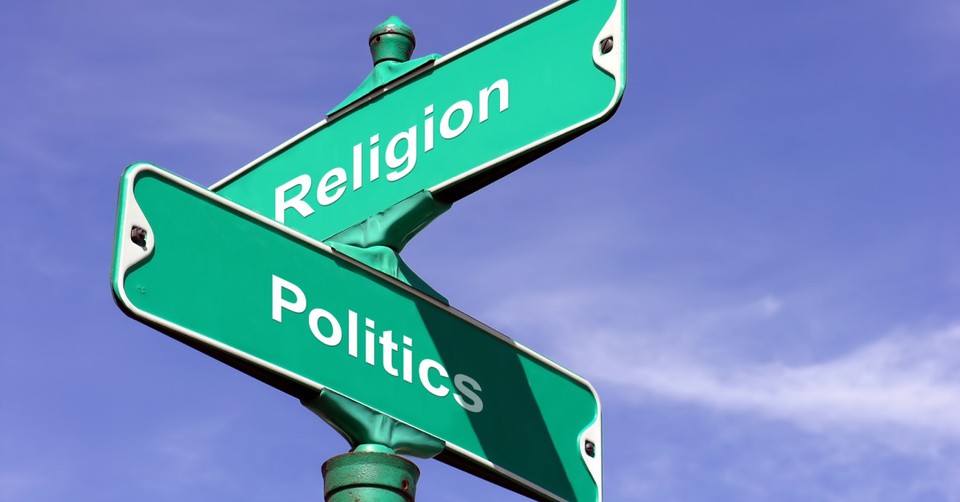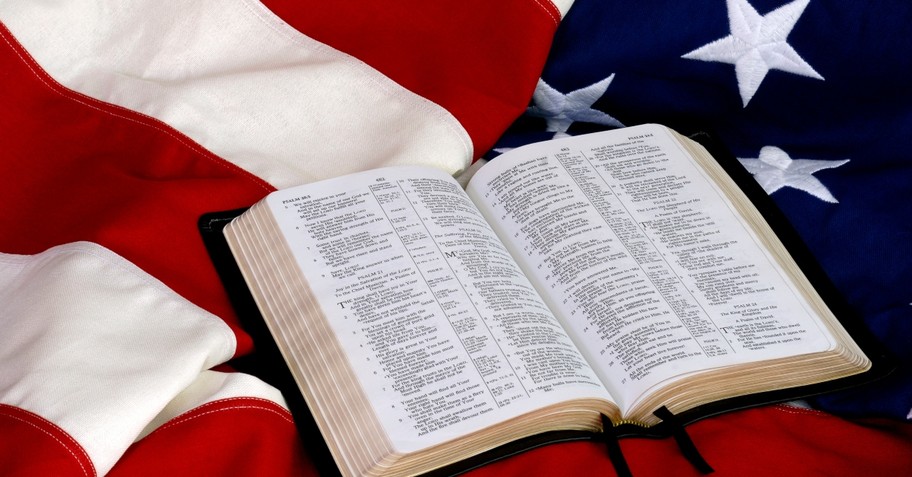Is it Possible to Separate Your Politics from Your Faith?

The debate on this topic is as wide as the Red Sea parting, with Christians voicing views as extreme as those of the Leftists and Right Wingers and everything in between.
There are those who argue that not only is it possible to separate the two, it’s imperative. Politics and faith don’t mix. And shouldn’t. Politicians and politics, after all, don’t save souls, so why waste valuable time, energy, and money? Rather, they proclaim, Christians should channel all of that into evangelism, which has more eternal value. This camp of believers, however, runs the possible risk of becoming ignorant about societal issues and, therefore, unable to address the spiritual needs of those struggling with them.
On the other side, there are those who can’t seem to make the delineation between politics and faith and, frankly, don’t want to. For them, their politics and their faith are synonymous and melded in such a way as to make them practically indistinguishable. This camp of believers tends toward political idolatry and easy manipulation as they put their trust and hope in politicians and policies rather than in God.
Both extremes can be (and have been) divisive and dangerous, particularly within the Body of Christ, where believers are called to be united, of one mind, and to live at peace and in harmony with one another (1 Peter 3:8, Romans 12:16, 18, Philippians 2:2).
But with the ever-widening gap over ideologies about the environment, race, gender identity, gun control, marriage, and the beginning of life (to name a few), it is becoming increasingly harder and harder for believers not to be affected and then be expected to remain neutral. It is nearly impossible not to get pulled into the vortex of partisan politics, which is consuming our country today.
So, what’s a sincere, conscientious Christian to do? I’ll get to that in a minute.
First, though, I want to look at Scripture, to see what the “non-partisan platforms” of God are. What is His “agenda” regarding how we’re to promote the betterment of our society, our world, and, most importantly, our “neighbor,” based on the second greatest commandment (Matthew 22:39)?
Photo Credit: ©Getty Images/J.S. Winborne
1. Justice
Justice for and the defense of the poor and oppressed, the afflicted and destitute, the voiceless and overlooked, the alien and marginalized, the orphan and widow—our “neighbors” whom we are to love as ourselves—is uppermost in God’s mind and heart. Whatever we can do to help improve these unfortunates’ plight and lives (which can involve enacting policies at the local, state, and federal levels) brings God glory and honor (Psalm 82:3, Proverbs, 14:31, 31:8-9; Isaiah 1:17; Jeremiah 22:3; James 1:27).
2. Peace
Our neighborhoods, cities, and nation should be better places because of our presence and witnesses there. As peacemakers—those who actively try to reconcile people to God and to one another—we should not be the cause of divisions, but, rather, offer ourselves as examples through our obedience to our government and its authorities. (Jeremiah 29:7; Romans 12:18)
3. Life
God is not about destroying, damaging, or dehumanizing life, given He is the author of it. As image-bearers, all lives matter, and God highly values each person—the born and the unborn—regardless of race or ethnicity.
4. Government
Believe it or not, government is God’s idea; therefore, government is good. It’s in place for our societal well-being. God chooses to use human governments to carry out His will in the civil sphere. The basis for this is found in Genesis 9:5-6, where God gives guidelines for dealing with murderers (after Cain killed Abel), thus implying that people collectively should set up governing bodies to administer justice.
Governments are so important, God tells us to obey them and not to rebel against them (unless their laws are contrary to His). He also commands us to pray for rulers (Romans 13:1-2, Timothy 2:2).
Now, to our part.

1. Be firm in our faith
For believers, our faith comes first. That should go without saying, but there are those who have it the other way around. Politics comes first. Says Pastor Andy Stanley, “Evaluate politics through your faith rather than create a version of faith that supports your politics.”
If our faith is solid and uncompromising—built on the foundation of God’s immutable Word—then it will inform, or determine, our politics. The Bible provides the guiding principles for everything in our lives, including proper and faithful political engagement. Our faith, then, should, by all means, influence our voting, platform, and policy priorities.
Without a firm faith, we open ourselves up to manipulation, indecision, and compromise.
2. Critically evaluate and pray about each party and their platforms
No one political party’s platform aligns 100 percent with God’s agenda, says Pastor Timothy Keller. Each party champions issues which Christians can get behind.
Democrats: the environment, universal healthcare, social programs, disability rights, criminal justice reform
Republicans: the sanctity of life and marriage, protecting Constitutionally guaranteed freedoms, economic growth, a strong military, and national security
Keller says he intentionally does not advocate for one party over another from the pulpit, for fear it may alienate those on either side from coming to church. And as far as which party to support, he offers this, “Get into whatever party you think you can do the best job in, as Christians. And be critical, don’t sell your soul.”
As evangelical Christians, we should continually be evaluating and praying about the parties, their platforms, and policies and align ourselves with whichever one holds closest and truest to the Gospel and biblical teaching.
Photo Credit: ©iStock/Getty Images Plus/Tinnakorn Jorruang
3. To engage or not to engage
While nowhere in Scripture are we exhorted or commanded to engage in politics (other than to pay taxes, Mark 12:17), nor are there verses prohibiting it. That said, there are actually Scriptural examples that substantiate the need for Christian involvement in the political sphere.
“In the Old Testament, for example, Joseph and Daniel served in foreign administrations and used their influence to implement policies that benefited society. In the case of Joseph, during a devastating famine (Genesis 45:9-12), God used his position in the Egyptian government to protect and provide for his extended family (which would become the nation of Israel). Queen Esther used her influence in the Persian government to save the Jewish people from a state-sanctioned genocide (Esther 8),” notes David Closson, director of Christian Ethics and Biblical Worldview at Family Research Council.
Christians, therefore, have the freedom to engage (or not to engage) in politics, to use their gifts and talents God has entrusted to them there, just as they would in any sphere, business, or industry. However, there is a great need for conservative-holding, Biblically-minded, God-fearing believers to serve as politicians, activists, lobbyists, aides, on town councils and school boards, to be “salt and light” and “ambassadors for Christ” (Matthew 5:13-16, 2 Corinthians 5:20). Our warped world needs to hear counter opinions and suggested policies that align more with God’s purposes.
“Christians ought to…leverage their influence for the advancement of laws, policies, and practices that contribute to the flourishing of our neighbors,” says Closson.
Jon Kuhrt, former CEO of West London Mission and now a government adviser in the UK, agrees. “As believers in God we have much to bring to politics—a deeper commitment to justice and compassion, which throughout history has made a difference in the political sphere through people like William Wilberforce, Lord Shaftesbury, Elizabeth Fry, Martin Luther King, Desmond Tutu, and many others.”
Mike Pompeo, former Secretary of State and director of the CIA, agrees. “[My faith] undergirds everything that I do. I was America’s Secretary of State, my oath was to defend the United States Constitution and people of all faiths, but I also looked at everything from a Christian worldview. That’s who I am, that’s my grounding, it’s my center point. So, it impacted every single decision that I made, there’s no doubt about that.”
While not all of us are called to run for office, at the very least, we should vote in local, state, and federal elections (Romans 13:6). Through voting, it is possible to influence the outcome of an election and thus an issue. Furthermore, “by voting,” Closson says. “Christians are entrusting their “sword-bearing” responsibility to officials who will govern on their behalf. Seen from this perspective, voting is a matter of stewardship; failure to vote is a failure to exercise God-given authority.”
Superseding voting is praying for governmental authorities, which is one of God’s directives. Everyone in power is there by God’s grace and appointment. Whether they know it or not, they are His ministers, set in place to administer civil justice (Daniel 2:21, 1 Timothy 2:1-2). And they need our prayers!
For specific ways in which to pray for political leaders, go to:
- 10 Scriptures to Pray for Our Nation and Our Leaders
- How to pray for your government leaders
- Prayer Guide: How to Pray for Our Country's Leaders
Whether we engage in the political sphere or not, there is the inevitability that we will engage at some point in political conversations. So…

How should Christians handle conversations regarding politics?
Wisely and carefully. Again, our goal is preserving unity, both with our brethren and the unbeliever.
“We can (and will) still disagree about a lot of things, including our political views,” says Christine McParland. “But because Christian unity goes deeper than any worldly commonality we could ever share, it transcends our disagreements. Christian unity depends not on how we vote but on a mutual commitment to follow Christ in obedience, love, and the pursuit of righteousness and justice. Can you imagine the impact on our nation and the world if the church was truly and fully united? What an undeniable, unstoppable, and unconquerable witness to the transforming power of the gospel!”
In short, we can disagree politically but still love unconditionally. How? By exercising the Fruits of the Spirit: love, joy, peace, patience, kindness, faithfulness, gentleness, generosity, and—most especially—self-control (Galatians 5:22-23). Add to these, forbearance (“allowance, tolerance, sufferance”), particularly when a topic you may have a strong and/or opposing view on is brought up.
Above all, remember Who you represent before you open your mouth. You are God’s ambassador, speaking on His behalf, not your own. Therefore, let your speech be “always full of grace, seasoned with salt, so that you may know how to answer everyone” (Colossians 4:6). And, when necessary, keep quiet. Practice James 1:19, “Everyone should be quick to listen, slow to speak, and slow to become angry.”
Conclusion
Separating one’s politics from one’s faith is nearly impossible. While we know that Jesus and the Good News is the only hope for this world, that doesn’t mean we should withdraw completely or get overly involved in politics. It means we use wisdom and discernment when it comes to our political leanings. We engage with and in our world (including its culture and politics) through the lens of our faith, never compromising or “selling our souls,” but being faithful witnesses and ambassadors for God and His kingdom, however that may look for each believer.
Photo Credit: ©Getty Images/lawcain
Originally published August 15, 2022.









